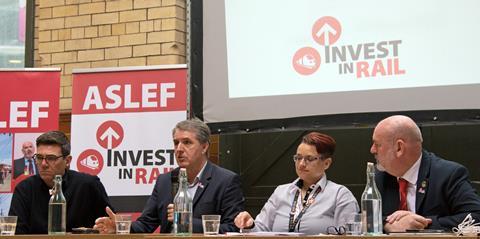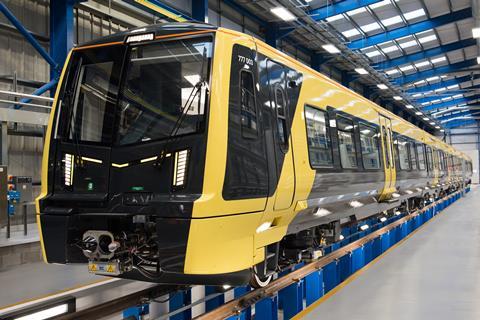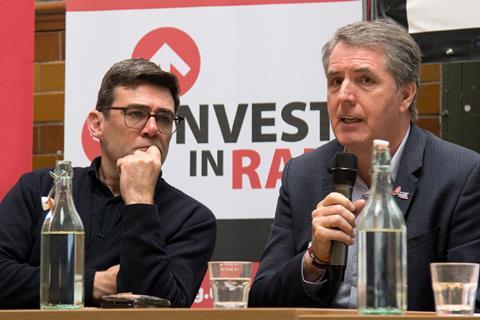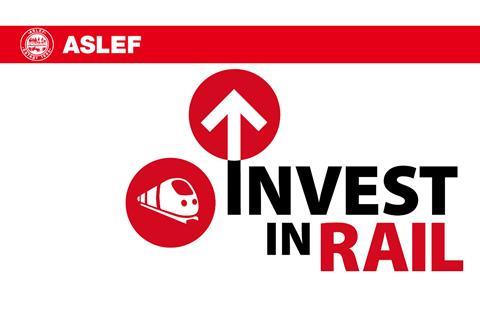
UK: Mayor of Greater Manchester Andy Burnham and his Liverpool City Region counterpart Steve Rotheram called for more investment in public transport and greater devolution of budgets and control at a meeting held in Manchester on May 12 as part of the ASLEF trade union’s Invest in Rail campaign.
Along with ASLEF General Secretary Mick Whelan, the mayors said that rail is a clean, green and safe transport option, and called for a number of initiatives including:
- a rolling programme of electrification;
- continuation of High Speed 2 to Scotland;
- improved accessibility and step-free access;
- encouraging more freight onto rail;
- delivery of Northern Powerhouse Rail in its entirety, including ‘a proper solution to the [rail] congestion in and around Manchester’.

Rotheram said devolution of Merseyside’s railways had enabled the procurement of the Stadler Class 777 EMUs as ‘the most sophisticated trains in the country’, and with further control of all public transport in the region he was ‘genuinely starting to create a London-style integrated transport system’.
He was deeply critical of the government’s Integrated Rail Plan announced in November 2021, saying the slimmed down option for Northern Powerhouse Rail was a ‘cheap and nasty version’ which emphasised a north/south divide in public transport investment.
He claimed service frequencies in London and the southeast mean that passengers rarely need to consult timetables, and called for the same levels of service in the north.
Broken promise
Burnham said ‘the government cannot level up the north of England with the south without investing in rail; it’s as simple as that’. He told the audience ‘we are not getting anything like what we were promised when [then Chancellor] George Osborne came here in 2014 to promise the Earth’.
Bunham said Greater Manchester is being let down by the operator, government and Department for Transport decision-makers who are setting priorities and investment plans.

He highlighted where he felt this was most evident: the ‘officially congested infrastructure’ through the Castlefield Corridor, where the 2018 timetable promised what local people wanted but came without infrastructure investment to support it; the ‘hollowed out’ timetable now operated for reliability; the cost of local journeys ‘which you would not pay in London for an equivalent distance’; and the high cost of walk-up long-distance journeys ‘which says to you that the interests of this industry are focused on serving itself internally first before serving the public’.
Burnham also expressed concern about the platform-train interface, saying ‘how can it be that in 2022 people with protected characteristics under the Equality Act cannot use public transport in the city centre?’
He said the decision not to construct a sub-surface HS2 station at Manchester Piccadilly will mean that services on the truncated east-west Northern Powerhouse Rail route will have to reverse and ‘also takes away a massive redevelopment plan we had for the area’.
He said the site ‘could be the beating heart of a resurgent north of England if you protected the land on the surface for jobs and then built beneath it a continental-style layered station. They tell us it would cost two or three billion more, has that ever been a problem in London? They want to build the wrong solution that will repeat the mistakes of the past.’
Burnham concluded ‘after five years of banging my head against the brick wall as I’ve had to do, it gets you to a place where you’ve had enough. I’ve had enough of them and the way they just do not bring solutions to some of the things that need sorting.
‘I fully support the Invest in Rail, campaign, in the northwest we don’t even get a second-rate service; we need to move to full nationalisation with regional devolution so Steve and I can integrate our public transport systems, take control of our stations so we can make them look decent and accessible. Until it’s a railway for everybody we won’t have a proper solution.’
Managed decline
ASLEF’s Whelan accused the government of overseeing a managed decline of the railways. He said the union had been calling for a vertically-integrated, publicly-accountable, safe and affordable railway long before the pandemic, and if this requires devolution of powers to the mayors ‘then that’s the right thing to do’.
He said the COP26 climate summit had failed to deliver any concrete promises or commitments, and pointed to decisions being taken elsewhere in Europe to develop and grow rail use, from the 20% cut in public transport fares announced in Ireland to France’s move to prohibit internal flights where a rail journey of under 4 h is available.
‘All over Europe we’ve got people saying that they’re going to electrify and decarbonise their rail infrastructure and they’re going to create the clean air for their children and grandchildren’, he said.

He suggested that the collapse in commuter traffic as a result of the pandemic provides a perfect opportunity for a geographical re-balancing of investment.
Calling for an end to the ‘snouts in the trough’ world of private operators, Whelan said ‘I know that before Covid for every £1 invested in transport £5 was added to the economy. That means you do not have to run public services at a profit because they generate their own profit for the greater good. Even in the post-Covid world the government’s own figures tell us that every £1 invested in transport brings £2·50 to the economy.’
Whelan concluded by saying ‘we will be writing to every MP in the country, regardless of political bias to say “what do your communities need from rail, what do they need in infrastructure and what do they need in public transport?” Then we will stand up in every community, in every city and say “we demand what people want and we want a greener more effective railway as part of an over-arching integrated transport system.” We need rapid change in our railway and we need the investment to do so.’



